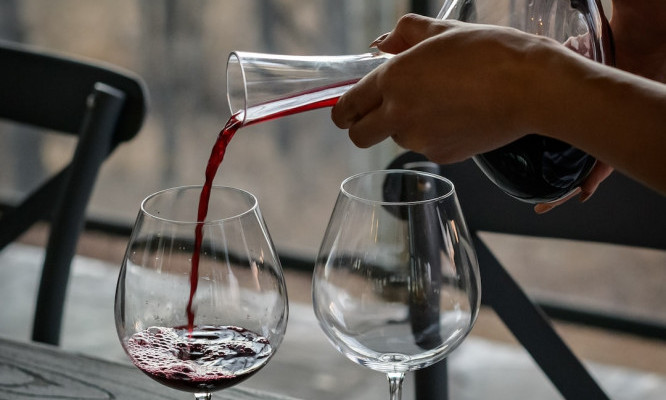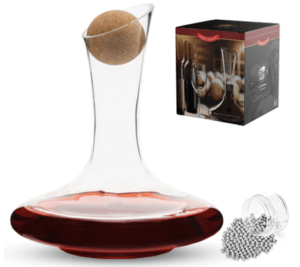
Should I decant Bordeaux wine?
French people will talk about “carafer un vin”, when english-speaker will say “decant a wine”. However, in both cases, pouring a wine in a decanter can be used in two very separate ways and for two separate reasons.
Let’s take Bordeaux for instance? Why ? Because it’s mostly Bordeaux (or Bandol) wine you’ll be looking to decant.
This concerns only red Bordeaux wine however. White wines, having no tannins, do not need to breathe nor to be decanted.
The question is : should I decant a Bordeaux wine?
You either want to let a Bordeaux wine breathe or you want to decant your Bordeaux. (You rarely want to do both)
So what is the difference ?
What does decanting a wine mean?
I recently did a post on Should you let Bordeaux breathe? Letting a wine breathe, ie oxygenating a wine, is not the same as decanting a wine.
Oxygenating a wine means bringing oxygen to a wine : this will change the wine’s aromas and flavours. If you want to know all about letting a wine breathe, I recommend you check this post out.
Decanting a wine means separating the wine from its sediment.

Get the difference?
When should you decant a Bordeaux wine?
So when should you decant a Bordeaux wine? Well, first and foremost, the wine will have to been aged for a long time in the bottle.
Indeed, an old wine will usually have a large deposit and thus must be decanted. This deposit is natural. It is formed during the aging of many quality reds.
How should you decant a Bordeaux wine?
If you’ve read my article on letting a Bordeaux breathe, you will understand that you must be gentle with an old wine. Remember, it’s like waking your grandma up. You are not going to wake her up as you do your teenage boy.
So you’ll start by removing the bottle from wherever it is stored (hopefully horizontally) and keep it as still as possible. Take care not to stir the deposit. Uncork slowly and hold the bottle in front of a light source of light.
Pour the wine gently in the decanter : let the wine run down the side of the decanter.

When the deposit is visible near the neck, stop pouring.
If you’ve rushed the first part and stirred the deposit, or if there is a lot of deposit, you can always double decant. It means pouring the wine (the same way) again into another decanter or the bottle (after having removed its sediments of course)
For that, you can either rinse it quickly but it must be dry when you put the wine back in. We wouldn’t want to dilute our wine.
What decanter can you use?
Then again pay attention to the numerous wine decanter models.
If you’re trying to decant the wine, meaning to separate the wine from its sediments, you should pick a decanter with a thin chimney and a very wide base that will the allow the wine depositis to separate from the wine itself. Usually, this type of decanter comes with a cap to limit the oxydation.
Again, a old wine shouldn’t get too much oxygen, let it open up gradually.
My recommendation (which you can find on Amazon):

Should I decant a Bordeaux wine?
This time, the answer is rather straightforward. Take the bottle near a source of light (or bring the source of light to your wine) and look if there’s any sediment at the bottom of your bottle.
If there is a large deposit, I would recommend you decant your wine. Otherwise, the person who gets the last glass may have more to eat than drink…
If there is not deposit, I recommend you read my post on Should you let Bordeaux breathe and learn to oxygenate it the right way.
As an Amazon Associate I earn from qualifying purchases






